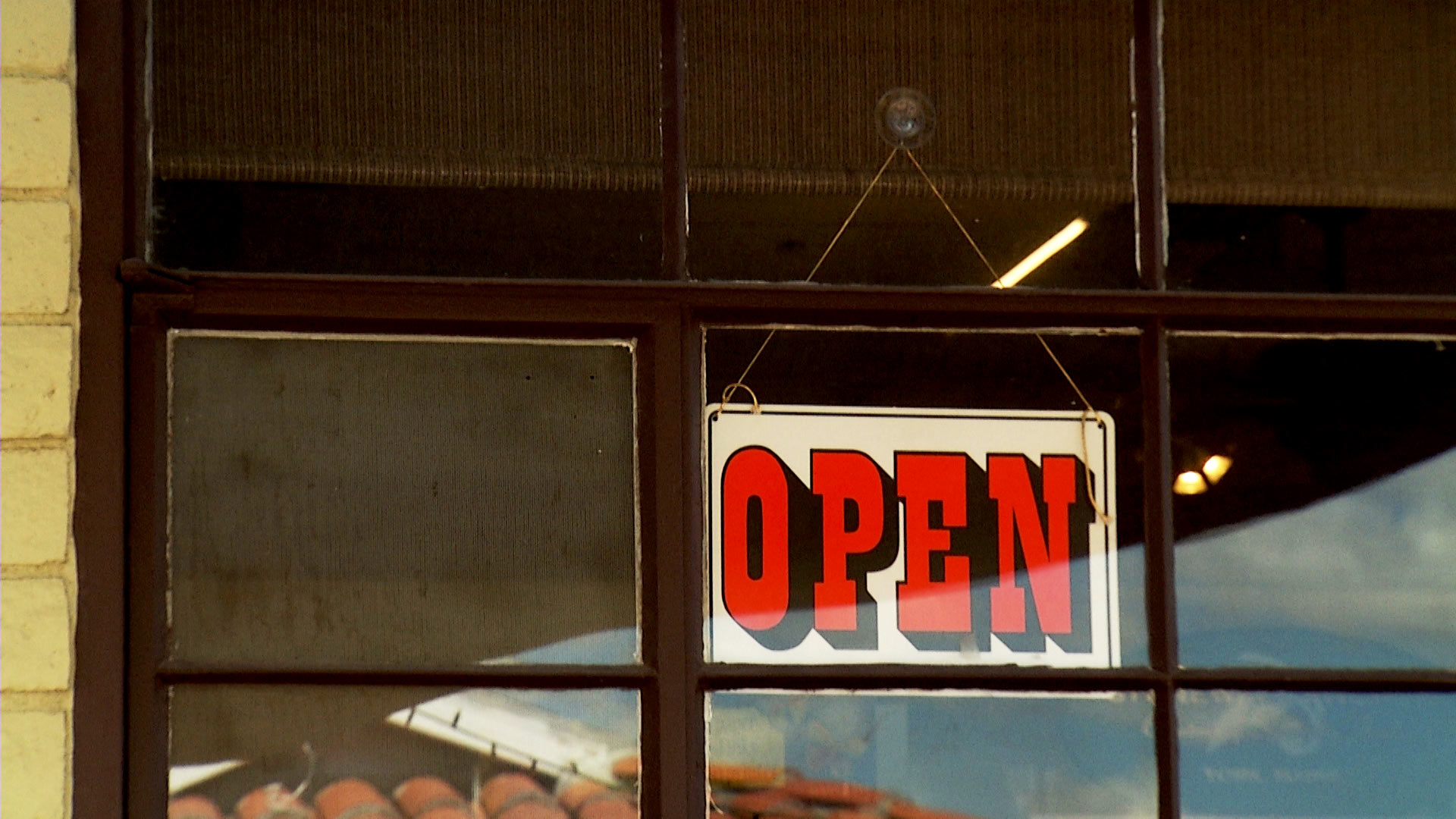 An open sign hangs in the window of a business in Patagonia.
An open sign hangs in the window of a business in Patagonia.
Restaurants reopened this week across Arizona, but only vaguely resembling their pre-pandemic selves.
Dining rooms contain half as many tables, plexiglass barriers separate cashiers from patrons and taped markers dot the floor at 6-foot increments. At Mama Louisa’s in Tucson, the changes start before you open the door.
“We are installing little kick plates you can use to open the door,” said owner Michael Elefante. “Every 30 minutes we’re having somebody go up front to sanitize the door handles.”
Elefante said reopening the 64-year-old Italian restaurant on Craycroft came down to one thing: his staff, some of whom have been there for over a decade.
“We wanted to make sure our people weren’t stressing out about not being able to pay bills because they didn’t get unemployment or they didn’t get a stimulus check or something,” he said. He asked them if they were comfortable coming back to work. “There was not a single person who said 'no.'”
Restaurants across the state are now faced with a decision: Reopen and risk becoming the next conduit for the coronavirus, or face the financial austerity of remaining closed. Some don’t have a choice, but experts warn the revamped restaurant experience can only go so far in preventing the spread of COVID-19.
Gov. Doug Ducey has issued guidance for reopening restaurants that includes covering faces, sanitizing surfaces and disposing of menus and condiments. Pima County issued more specific guidelines that, when followed, earn the business a compliance badge. Among them, that restaurants must operate at 50% capacity or lower.
Steve Chucri, president of the Arizona Restaurant Association, said that won’t be sustainable in the long term. “We’re a pennies business to begin with. You can’t make the money if you don’t fill your dining room,” he said.
The food and beverage industry has lost $27 million a day since the governor’s order closing restaurants, according to estimates by the restaurant association. That has left many eager to reopen their doors.
But Chucri said it won’t be easy. Arizona’s tourism season has passed and given way to the notoriously slow summer. Vacant office buildings and shuttered theaters mean fewer regular patrons. And many restaurants are finding their suppliers can’t provide the food they need.
The restaurant association estimates as many as 8% of restaurants have closed already. “Restaurants who were on the verge of closing, or kind of on that bubble on whether or not they can continue forward, they’re looking at this and saying, 'Now might be the time to get out,'” said Chucri.
“Restaurants who were on the verge of closing, or kind of on that bubble on whether or not they can continue forward, they’re looking at this and saying, 'Now might be the time to get out'” Steve Chucri, president of the Arizona Restaurant Association
Most Americans aren’t yet comfortable dining out — 78%, according to a Washington Post-University of Maryland poll released last week. But University of Arizona epidemiologist Kacey Ernst said she fears quarantine fatigue will lead to a spike in new cases.
“Even myself, even though I know better, I can feel myself sort of subconsciously relaxing a little bit, knowing very well that we are opening at a point where our case numbers and new case numbers are actually higher than when we closed,” she said.
She said the precautions restaurants are taking are better than nothing, but they aren’t perfect. She points to new research out of the Guangzhou Center for Disease Control and Prevention that found the virus was able to spread through a restaurant’s air conditioning system.
“Depending upon the ventilation and the circulation of the air, you can get infected by somebody who is actually further than 6 feet apart from you,” said Ernst.
Some restaurant owners have decided it's not yet worth the risk. Hundreds of business owners have signed a public letter under the banner Too Soon Arizona. The businesses “feel proceeding incautiously with the reopening of businesses will worsen human suffering in our communities and prolong the negative impact this pandemic is having on small businesses & the economy.”
One of those businesses is the Hop Shop in Tucson. Owner Jessie Jean said she’d like to see a decline in the number of new cases and an increase in testing before she opens her doors.
She said she can afford to stay closed because of a federal loan that allows her to keep paying her employees. But that loan can only be used for payroll and runs out in two months.
By that point, she said, she hopes she'll be able to learn from the restaurants that are reopening now.


By submitting your comments, you hereby give AZPM the right to post your comments and potentially use them in any other form of media operated by this institution.